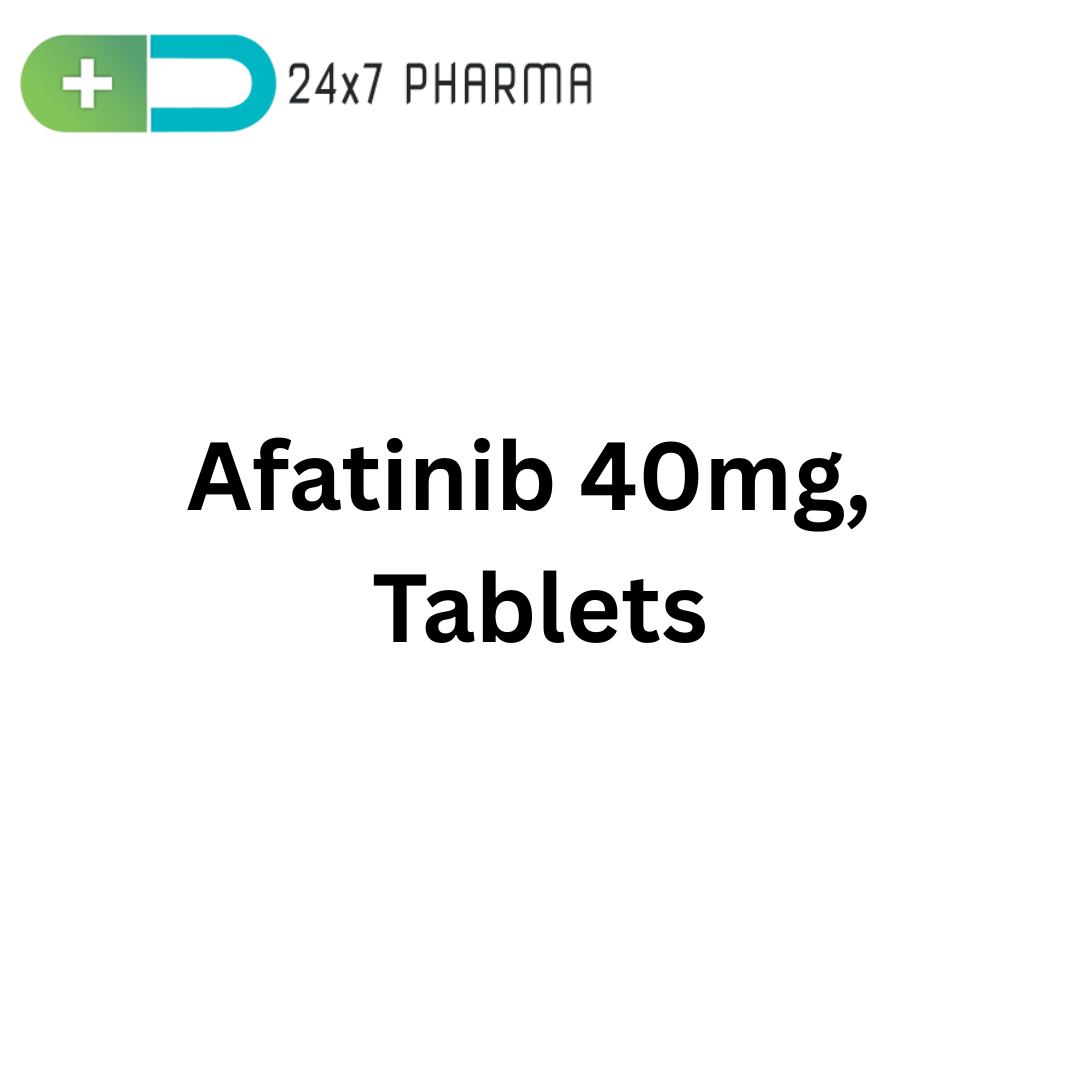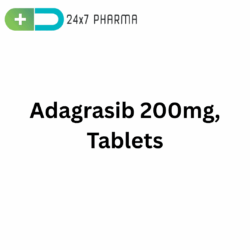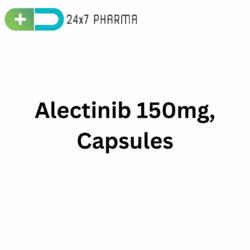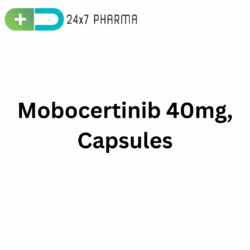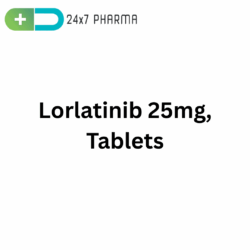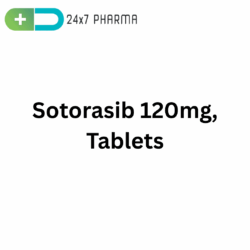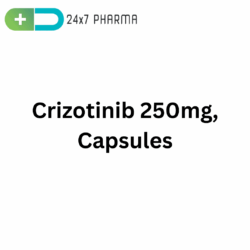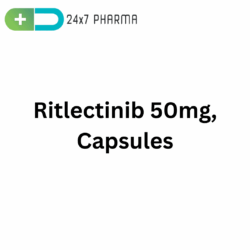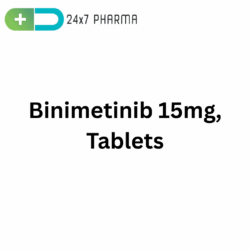LuciAfa 40mg, Afatinib Tablets
LuciAfa 40 mg Afatinib represents a powerful and targeted therapy option for patients with EGFR-mutant NSCLC. Its mechanism of irreversibly inhibiting multiple ErbB receptors translates to significant clinical benefits, particularly in progression-free survival.
LuciAfa 40mg is the generic version of Afatinib, a tyrosine kinase inhibitor (TKI) that fights cancer. It is primarily used to treat non-small cell lung cancer (NSCLC), especially in patients who have certain mutations in the EGFR gene.
Mechanism of Action
LuciAfa 40 mg is a generic formulation of Afatinib, a second-generation tyrosine kinase inhibitor (TKI) used primarily in the treatment of non-small cell lung cancer (NSCLC) with specific mutations in the epidermal growth factor receptor (EGFR) gene.
Afatinib is an irreversible tyrosine kinase inhibitor (TKI) of the second generation. It works by targeting and permanently blocking multiple members of the ErbB family of receptors, including:
- EGFR (ErbB1)
- HER2 (ErbB2)
- ErbB3
- ErbB4
These receptors are part of signaling pathways that control cell division, survival, and growth. In some cancers—especially NSCLC—mutations in EGFR lead to continuous, uncontrolled activation of these pathways, causing cancer cells to multiply rapidly.
Indications
LuciAfa (Afatinib) is approved for:
- First-line treatment of metastatic NSCLC with EGFR mutations (exon 19 deletions or exon 21 L858R substitution).
- Treatment of squamous cell carcinoma of the lung progressing after platinum-based chemotherapy (less commonly used for this indication).
- Off-label uses in other solid tumors with aberrant EGFR signaling (under clinical discretion).
Dosage and Administration
LuciAfa should be taken exactly as prescribed by your healthcare provider.
- Recommended Dose: 40 mg orally once daily.
- Administration: Take at least one hour before or two hours after a meal, on an empty stomach.
- Missed Dose: Take the missed dose as soon as you remember it if it has been more than 12 hours since the last dose. Don’t double up; omit the missing dose if there are fewer than 12 hours left.
Storage:
Store LuciAfa 40 mg at room temperature (20°C–25°C), in a dry place, away from heat, light, and moisture. Do not store it in the bathroom.
Other Dosage Forms
Afatinib comes in three different dosage forms: 20 mg, 30 mg, and 40 mg pills. The specific dosage prescribed depends on the patient’s condition, response to treatment, and tolerance. Adjustments may be made for patients with hepatic or renal impairments.
Side Effects
Common adverse effects include:
- Gastrointestinal: Diarrhea, nausea, vomiting, loss of appetite.
- Dermatological: Acne, dry skin, rash, mouth sores.
- Ocular: Eye irritation, visual disturbances.
- Other: Fatigue, cough, abdominal pain.
Serious side effects may involve:
- Interstitial lung disease (ILD) is characterized by fever, coughing, and dyspnea.
- Hepatotoxicity: Elevated liver enzymes, jaundice.
- Cardiac: Symptomatic left ventricular dysfunction.
Regular patient monitoring is necessary to look for these possible negative effects.
Benefits
- Targeted therapy effectively controls tumors by specifically inhibiting EGFR mutations.
- Irreversible Binding: Provides sustained receptor inhibition, enhancing therapeutic efficacy.
- Oral Administration: Convenient daily oral dosing improves patient compliance.
Prescription Information
LuciAfa 40mg is a prescription medication. It is essential to have a confirmed diagnosis of EGFR mutation-positive cancer before initiating treatment. Regular monitoring through imaging studies and laboratory tests is necessary to assess treatment efficacy and detect potential side effects.
Drug Interactions
Afatinib may interact with various medications, which can affect its efficacy and safety:
- P-glycoprotein (P-gp) Inhibitors: Drugs like ketoconazole may increase afatinib levels, raising the risk of side effects. Dose adjustments may be necessary.
- P-gp Inducers: Medications such as rifampin can decrease afatinib levels, potentially reducing its effectiveness. Dose adjustments may be required.
- Antacids and Proton Pump Inhibitors (PPIs): These can reduce afatinib absorption; consult your healthcare provider on the timing of these medications.
- Grapefruit and Grapefruit Juice: Avoid consumption as they can increase afatinib blood levels.
FAQs
Q1: Can LuciAfa cure lung cancer?
No, LuciAfa is not a cure, but it can slow cancer growth and improve quality of life in EGFR mutation-positive lung cancer patients.
Q2: Is LuciAfa available over the counter?
No, LuciAfa is a prescription-only medicine and should be taken under the supervision of a healthcare professional.
Q3: Is LuciAfa suitable for all types of lung cancer?
LuciAfa is specifically indicated for NSCLC with activating EGFR mutations. It is not effective for EGFR wild-type or resistant mutations.
Q4: Can I drive while taking LuciAfa?
Caution is advised, as LuciAfa may cause visual disturbances and fatigue. Assess your individual response before engaging in activities requiring alertness.
Conclusion
It works by permanently disabling cancer-promoting proteins in tumor cells. LuciAfa helps improve survival, control tumor progression, and offers a better quality of life compared to traditional chemotherapy. However, like all cancer treatments, it comes with potential risks and side effects, especially diarrhea and skin issues. Regular monitoring and communication with your oncologist are essential to get the best outcomes from this treatment.
The availability of a more affordable generic version like LuciAfa makes personalized cancer therapy more accessible globally, particularly in developing nations. As lung cancer treatment becomes increasingly tailored to genetic profiles, afatinib remains a vital tool in the oncologist’s arsenal.

